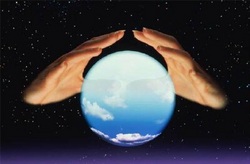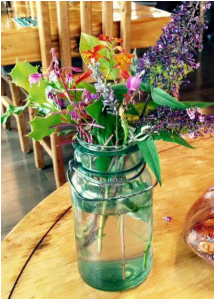
I was heartened by stories of community members reaching out to help their neighbors. Those who had, shared. Newscasters even announced that the shelters were not overflowing because of the community members who had opened their homes to strangers. There were far more volunteers than needed.
On my flight home, I sat next to a retired man from the Gulf Shores of Alabama, which he described as a great place for people to retire. He was originally from Birmingham - we talked about the tornadoes, then our conversation moved to the Gulf Oil Spill and Hurricanes Katrina and Ivan, all of which affected this same geographic area. I heard something from my seat-mate that was different from what I usually hear - his perception of the oil spill, for example, was that the negative effects on the ocean, beaches, and wildlife had been significantly exaggerated. The oil spill had not interfered with his deep sea fishing at all, after the first couple of weeks of clean-up. He had not been affected by Hurricane Katrina, but one of his homes had been destroyed by Hurricane Ivan a few years earlier. He had the financial resources to rebuild, and life went on. He did also reveal that he was a millionaire.
I feel confused at times, trying to reconcile a brief personal vignette like this with scenes that I see on TV or in magazines, and with peer-reviewed research that I read. I crave answers and understanding. I do not think that the effects of these disaster phenomena are uniform. It makes sense that someone who has financial, vocational, health, and social resources prior to the event - as did this man, from what he said - will experience a lesser degree of stress than someone who lives week to week on a limited income, has health problems, and has fewer social supports.
So what? Is this just the way of the world? Are these discrepancies inevitable? Why am I even talking about this? Hang in there - I do have a point.
Social discrepancies like this become more pronounced when we look at the effects of environmental degradation, whether from natural disasters or from other disastrous events to which human choices have contributed. Discrepancies also become more significant when we look at gradual changes, such as those related to climate change or the decline in non-renewable natural resources, both of which are affected by human behavior/choice.
Consider the following example -- Most scientists involved in studies of the environment and of climate change see us as approaching (or as being at) the point of peak oil - our highest point of oil production, after which the availability of oil will gradually decline. It is predicted that, when we are at or beyond the point of peak oil, the prices of oil will sky-rocket (supply-demand theory comes into play) - which will have a huge impact on the typical western lifestyle.
In this situation, the resource discrepancy described above widens, and its consequences become more pronounced. Think about it - when gas prices creep - or leap - up (right now, it is 3.98/gallon at my station), some of us are able to just pay up without feeling too much pain, while others are deeply impacted in terms of our ability to get to work, the doctor, or the grocery. And oil and gas costs are tied into much, much more than personal transportation - they also affect the costs of transporting food across the country (or world), of heating and air-conditioning, of emergency medical and fire-fighting services, of manufacturing of millions of different products such as medicines and cell phones and home appliances - almost anything you can think of.
What responsibility do those of us with adequate or above-adequate resources have to those of us who are less fortunate? Do we keep shelling out 3.98/gallon or more and paying more for non-local food - those of us who can - with the belief or hope that someone will find some technological solution to the problem - while others' lives are severely hampered? Or do we start to think long-term about what we can do today - together with others - to offset the predicted climate change and/or its effects?
WE DO NOT HAVE A CRYSTAL BALL. The predictions related to climate change and peak oil are based on complex statistical modelling - and we don't know what we don't know about influential factors in the whole picture. I believe we know enough, however, that we need to think about and work together on these issues.
The cool thing about working with others on these issues is that you get to know some very smart, skilled, funny people - you have a good time while you are also doing good.
In the absence of a crystal ball, educate yourself. Go to the Resources page, for example, and visit the IPCC web-site, read through the Psychology and Climate Change documents. And don't stop there - find your own information and read with a critical and questioning mind.
And think about this -- what possible harm could come from working cooperatively with others to live healthier and more meaningful lives? I am betting the good would far outweigh any harm.


 RSS Feed
RSS Feed
